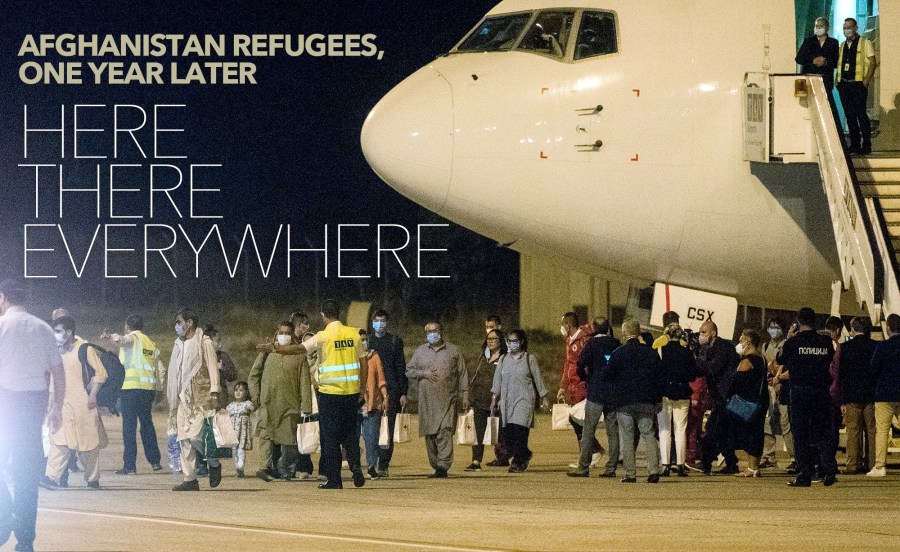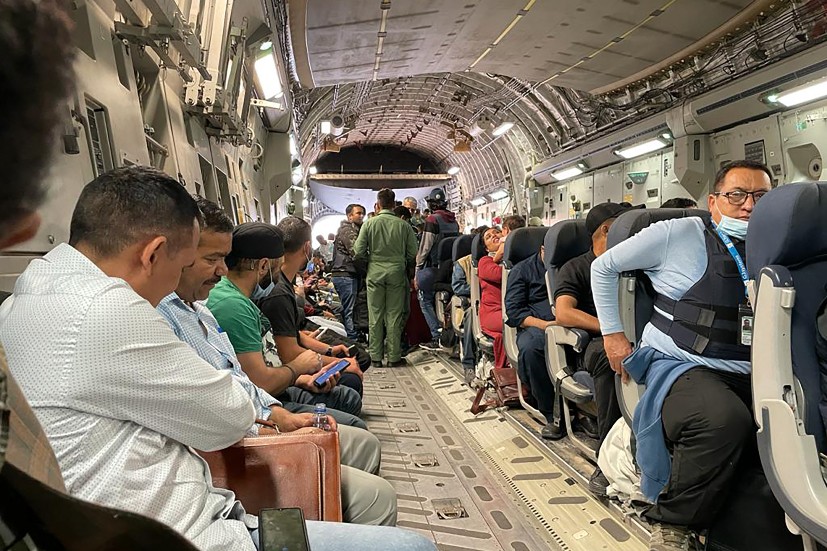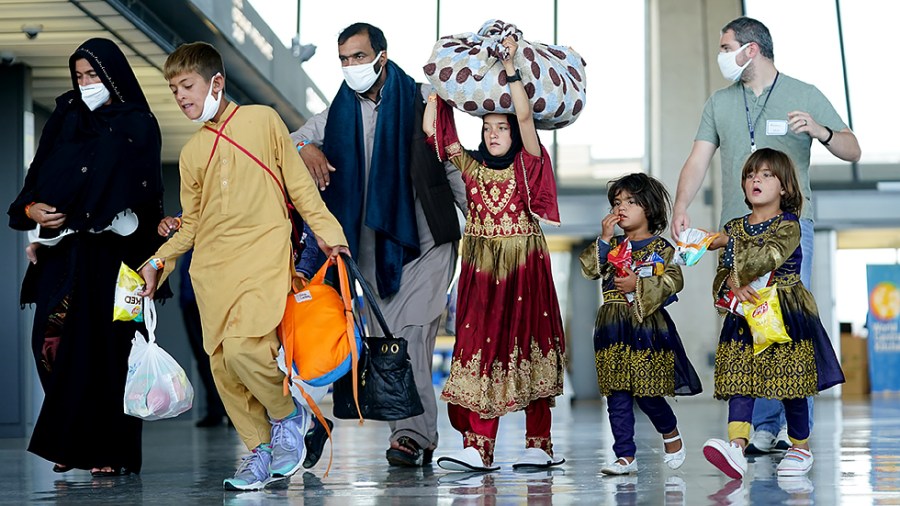Can’t go home, can’t enter the US: Thousands of Afghans remain stuck in between

Editor’s note: This is the third installment in a three-part series on Afghan refugees marking one year since the U.S. withdrew its military from Afghanistan, ending its longest war. The series — Here, There, Everywhere — tells the story of life after the evacuation through the eyes of Afghan refugees in the U.S., vulnerable Afghans who have been unable to escape the country, and those refugees scattered across the globe. To protect refugees and their families, The Hill used pseudonyms in this story. Read Part 1 in this series here and Part 2 here.
Yusuf and his brother Ibrahim were the lucky ones.
After the U.S.-led evacuation of Afghanistan ended, just a handful of privately-organized charter flights made it out.
They got the last two seats on the flight, one for Ibrahim, who was placed on the flight because of a medical condition, and one for Yusuf, to help care for him.
What they didn’t know is they would spend the next year of their lives trapped in the United Arab Emirates’s Humanitarian City.
Yusuf, 28, hesitated to go. He didn’t want to leave his wife and two daughters behind in Mazar-e-Sharif, but he was told they could come along shortly. And his family was pushing him to take the leap.
It would be just the first in a series of difficult decisions for Yusuf.
“It was very, very hard for me. The most hardest decision I’ve ever made in my life. And I really regret making that decision actually,” he said.
“I got out, me and my brother, and I was waiting for my family to get out too, but they never did, and it’s been one year now.”
The fallout of the Taliban takeover has created a massive Afghan diaspora. Those who didn’t get out on U.S.-sponsored flights left in charters that took them wherever they could get landing rights, leaving them scattershot across the globe, from next-door Pakistan to countries in Africa and South America.
Others have trickled through Afghanistan’s borders to neighboring countries, in some cases hopeful they will eventually make it to the U.S., a dream that clashes with a backlogged American bureaucracy.
Yusuf and Ibrahim landed in Abu Dhabi in September and, even amid the chaos, things were relatively good. It was a crowded camp with roughly 10,000 people, but the accommodations were comfortable.
And there was one key element keeping spirits high: flights were taking off, carrying refugees to a new life in the U.S.
But they halted in November, following a similar decision in September to halt flights from U.S. bases in Qatar and Germany after a limited outbreak of measles.
They did not resume for six months.
For a group of people who had already been through some of the most trying months of their lives — still grieving their exit, still worried about family members left behind in Afghanistan — the suspension of flights left many sinking into a deep depression.
“People were not mentally stable; people got sick; people ran out of money,” Yusuf said.
In June, one woman tried to commit suicide, jumping off the third floor of the apartment buildings housing refugees there.
“Some people, they have completely gone mental. The way they talk, the way they express themselves – I think they need immediate psychological care, medical care because they are this close to hurting themselves.”
– Ibrahim
For Ibrahim, 26, his medical problems have only worsened. He has ulcerative colitis, a disease that leaves his intestines lined with ulcers. It’s a difficult disease to contend with on its own, but it’s only exacerbated by stress.
And Yusuf, who spent the last three years in the high-octane environment of a military interpreter, is struggling with an idle life.
“Refugee camps are different than military camps,” Yusuf said.
“I was living in military camps for years. But refugee camp is different because you don’t have any hope for the future. There is no clear program for you, no mechanism of how your day will go. But for me, it was very frustrating,” he added.
“I see one year of my time, of my life, wasted.”
Residents of the camp aren’t allowed to leave, only transported outside for medical issues that can’t be treated on site. Many are exhausting whatever funds they came with, frustrated to be stranded with no ability to work.

Impatient camp residents launched protests in February, pressing the U.S. government to resume flights.
At one point, some refugees at Emirates Humanitarian City opted to return to Afghanistan, a decision some Yusuf has kept in touch with told him they now regret.
The two brothers stuck it out, only later to be informed they’d have to make another tough choice: Yusuf was offered a seat on a flight out to the U.S., but Ibraham was not.
It was a difficult decision compounded by Ibrahim’s medical condition. They have made friends at the refugee camp, but Yusuf is always at his brother’s side when he’s not feeling well.
“There are certain things you can’t ask a friend to do,” Yusuf said.
Yusuf worked for the military for three years, allowing him to qualify for a Special Immigration Visa (SIV), a program for those that aided the military that allows them to come to the U.S. But Ibrahim’s work with the military lasted only about six months, short of the yearlong requirement.
Accepting the offer to fly out would make Yusuf one of the few evacuated Afghans with a clear pathway to get to the U.S. Reports indicate there may still be as many as 6,500 residents at the camp in UAE – data the State Department will not confirm.
Elsewhere across the globe are others who got out, often with financial assistance from veterans or others based in the U.S., but who now have no idea if or when they’ll make it to the states.

Aryan, a doctor with a side business that contracted with the U.S. military, knew as soon as the evacuation ended that he would have to find another way out of Afghanistan.
“I saw that there was no other chance for me. The first week I made the decision, and I came to Pakistan,” he said.
He paid a travel broker $300 a person, a large expense for the 11-person family, to speed up processing of visas that otherwise would have taken about three months.
Life has been an adjustment for the well-heeled family. Despite a previously comfortable lifestyle, Aryan crossed the border with just $10,000 in cash.
“In Afghanistan, I have my own apartment, my house, my guest house, my car, my job,” he said.
“And suddenly it all collapsed. No job, no money, no house, no car. We lost everything.”
They’ve been slowly rebuilding a life in one of Pakistan’s largest cities. He sold his home in Kabul for extra cash. His children are in school but are blocked from getting access to the full suite of services since they are not Pakistani.
But primarily, his children are unsettled because they’re fearful for his safety.
The Taliban killed 17 of Aryan’s employees during the war, and they twice tried to kill him, once shooting at his car and killing two passengers and injuring two more, another time placing a bomb near his house that went off when he wasnt there, mangling a different car.
He too is concerned that the porous Pakistan-Afghanistan border could enable the Taliban to track him to his new location.
“My family has not adjusted yet, but we are between fear and hope,” Aryan said.
“My wife and my kids, they’re just thinking about me. They know that if something happened there’s no other person …You know, this is not Afghanistan. Because we don’t have any relation with more people.”
Aryan
Now it’s a waiting game. Their visas expire in August. He’s paid $7,000 to extend them.
Aryan has applied for a SIV, but even though he’s far along in the process, he’s yet to hear when he may get the final word of approval.
Others from less affluent backgrounds who made it to Pakistan are struggling even more.
Mohammad, who had a contract to run a radio station housed on a U.S. military base, had a picture of him conducting an interview flanked by the Afghan military that was published on a U.S. military website in 2009, creating headaches for him ever since.
Like Aryan, he’s already had multiple run-ins with the Taliban, in one case escaping when they came by his house by donning a burka and blending in with his female relatives as they told his would-be assailants he had just slipped out the back door.
He ended up criss-crossing the country for six months after the fall of Kabul until the Taliban came to his parents’ house and gave them a letter to pass along to Mohammad. It said they would “do things to you you will never have heard being done to another person.”
He got a visa to enter Pakistan, but now he barely leaves the studio apartment he shares with his wife and six children. His visa has expired and he’s scared to get caught without proper documentation. He tries to disguise his accent when he talks to people so they don’t realize he’s Afghan. He can’t work and has been surviving through charity from American contacts.
“Most days I eat one time. I eat breakfast and a little for lunch, and at night I sleep early because there is no dinner,” he said.
Pakistan is just one of many countries to receive a wave of Afghans over the past year. Many are well beyond the Middle East, reaching Kosovo, Albania, Brazil, Poland, Uganda and Australia.
Not all realized that after leaving they wouldn’t be able to easily immigrate to the U.S.
“Early on there was a meeting with [the Department of Homeland Security], and the officials at DHS were asked point blank, we asked them, ‘What is your plan for these people who have been resettled in Rwanda or Uganda or other places that are not the United States, but might not have a functioning asylum or refugee system?’ And DHS’s response was these people need to follow ‘normal immigration pathways.’”
– Chris Purdy, director of Veterans for American Ideals at Human Rights First
Purdy said while DHS has been working to come up with a plan to deal with those in third countries, it became clear that it would be key for charter flight destinations to be chosen selectively.
Some, like the group that aided Yusuf and Ibrahim, got Afghans to destinations like UAE where there are processing centers, but others landed in counties with no asylum system or that are not signed into the refugee convention.
“Is it better for them to be hunted and starving in Afghanistan or being in Uganda without potentially a future pathway? I don’t know, people need to make that call for themselves. My thought is anywhere is better than Afghanistan. That being said though, people were not thoughtful in how they dropped people off in places around the world. That still caused damage,” he said.
Yusuf ultimately decided to take the flight to the U.S. – Ibrahim encouraged him to do so.
“Because of myself I cannot prohibit someone else from going. Everybody has their own life. I don’t want this burden of problems on them; it is just for me to endure.”
– Ibrahim
Yusuf joined about 5,000 Afghans who have made it to the U.S. in what the government has deemed the second phase of the evacuation.
But it’s yet another decision he regrets.
“I’ve made a very bad decision. I shouldn’t have come here, I shouldn’t have left him behind. I always keep complaining about myself and keep blaming myself, ‘Why did I leave him behind?’” he said.
He’s been in the U.S. for roughly two months now, with plans to start a new job and move into a new apartment in September.
Every morning he wakes up early and calls his brother, then checks in on his children, and then his parents.
“For me life is so tough that sometimes I sit down, and when I get alone, I talk to God like, ‘Why have you put me in that kind of situation?’ Because sometimes I get tired too. Have you been in a situation where you don’t have the chance to get tired? You can’t get tired too. Like, if I get tired, three other families will collapse,” he said.
Ibrahim remains trapped in the UAE for the foreseeable future – unable to go home, unable to move on.

And life in the camp has gotten lonelier. He says he’s an introvert and acknowledges Yusuf is the more outgoing one – an excellent companion – while several of their other friends have left too.
But there’s little hope for getting out of the camp any time soon. The U.S. has stopped chartered flights from the camp, meaning anyone that leaves will likely have to be processed as refugees instead, something that takes years.
“Eventually he will be moved to somewhere, I believe that. But that takes time, and he doesn’t have much time,” Yusuf said.
“He’s sick. He needs care. He needs support.”
Ibraham said the uncertainty is the hardest thing to tolerate. The anniversary has him reflecting – he thought by this time he’d be in the U.S., working and sending money back to his family in Afghanistan.
“It is hard when a year passes and you look at the end of the year and it’s a blank sheet,” he said.
—Updated at 11:42 a.m.
Copyright 2023 Nexstar Media Inc. All rights reserved. This material may not be published, broadcast, rewritten, or redistributed. Regular the hill posts







